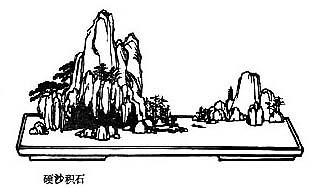Sun Zi 
 – The Art of War
– The Art of War
Chinese strategy explained : know yourself and the ennemy, use deception, spies, and "win with ease". Tr. Giles (en, annotated) and Amiot (fr).
Weak Points And Strong
Chang Yu attempts to explain the sequence of chapters as follows: "Chapter IV, on Tactical Dispositions, treated of the offensive and the defensive; chapter V, on Energy, dealt with direct and indirect methods. The good general acquaints himself first with the theory of attack and defense, and then turns his attention to direct and indirect methods. He studies the art of varying and combining these two methods before proceeding to the subject of weak and strong points. For the use of direct or indirect methods arises out of attack and defense, and the perception of weak and strong points depends again on the above methods. Hence the present chapter comes immediately after the chapter on Energy."
Sunzi VI. 1.
Sun Tzu said: Whoever is first in the field and awaits the coming of the enemy, will be fresh for the fight; whoever is second in the field and has to hasten to battle will arrive exhausted.
Giles VI.1.
Sun Tzu dit : Une des choses les plus essentielles que vous ayez à faire avant le combat, c'est de bien choisir le lieu de votre campement. Pour cela il faut user de diligence, il ne faut pas se laisser prévenir par l'ennemi, il faut être campé avant qu'il ait eu le temps de vous reconnaître, avant même qu'il ait pu être instruit de votre marche. La moindre négligence en ce genre peut être pour vous de la dernière conséquence. En général, il n'y a que du désavantage à camper après les autres. Celui qui est capable de faire venir l'ennemi de sa propre initiative le fait en lui offrant quelque avantage ; et celui qui est désireux de l'en empêcher le fait en le blessant. Celui qui est chargé de la conduite d'une armée, ne doit point se fier à d'autres pour un choix de cette importance ; il doit faire quelque chose de plus encore. S'il est véritablement habile, il pourra disposer à son gré du campement même et de toutes les marches de son ennemi. Un grand général n'attend pas qu'on le fasse aller, il sait faire venir. Si vous faites en sorte que l'ennemi cherche à se rendre de son plein gré dans les lieux où vous souhaitez précisément qu'il aille, faites en sorte aussi de lui aplanir toutes les difficultés et de lever tous les obstacles qu'il pourrait rencontrer ; de crainte qu'alarmé par les impossibilités qu'il suppute, où les inconvénients trop manifestes qu'il découvre, il renonce à son dessein. Vous en serez pour votre travail et pour vos peines, peut-être même pour quelque chose de plus.
Amiot

The Art of War – Sun Zi VI. 1. – Chinese off/on – Français/English
Alias Sun Tzu, Sun Wu, Sun Tse, Sunzi Bingfa, Souen Tseu, Souen Wou, 孫武.
The Book of Odes, The Analects, Great Learning, Doctrine of the Mean, Three-characters book, The Book of Changes, The Way and its Power, 300 Tang Poems, The Art of War, Thirty-Six Strategies
Welcome, help, notes, introduction, table.
Index – Contact – Top
